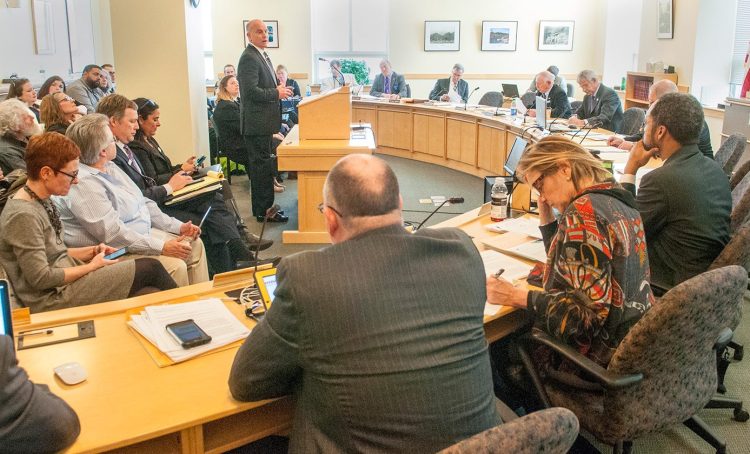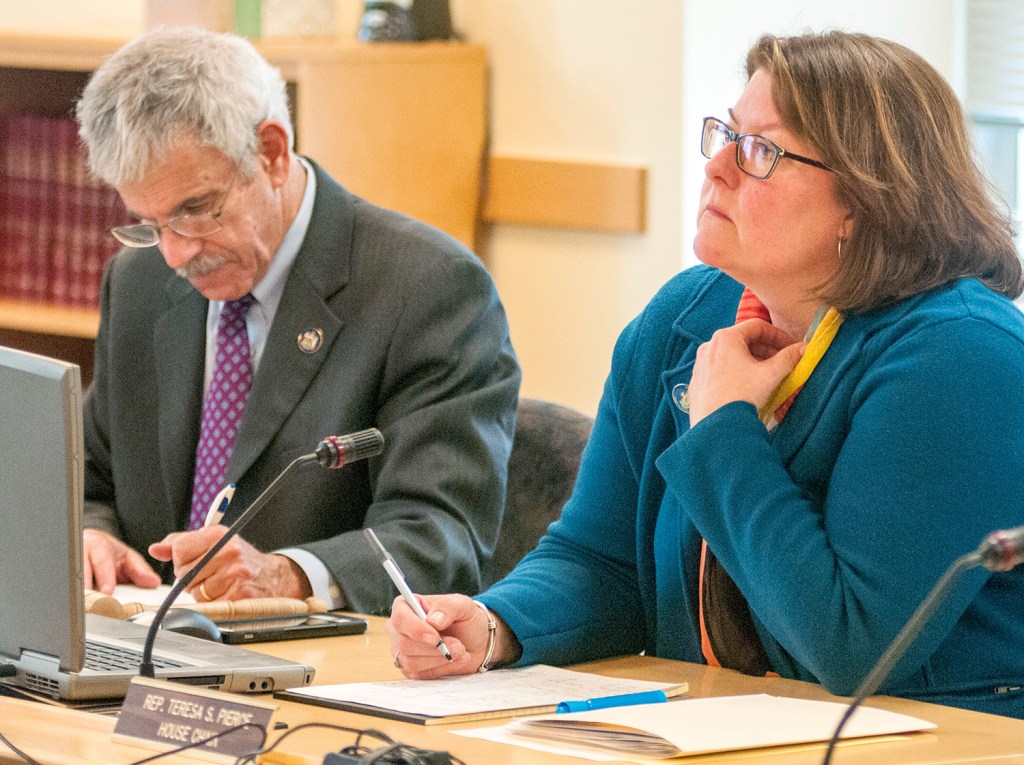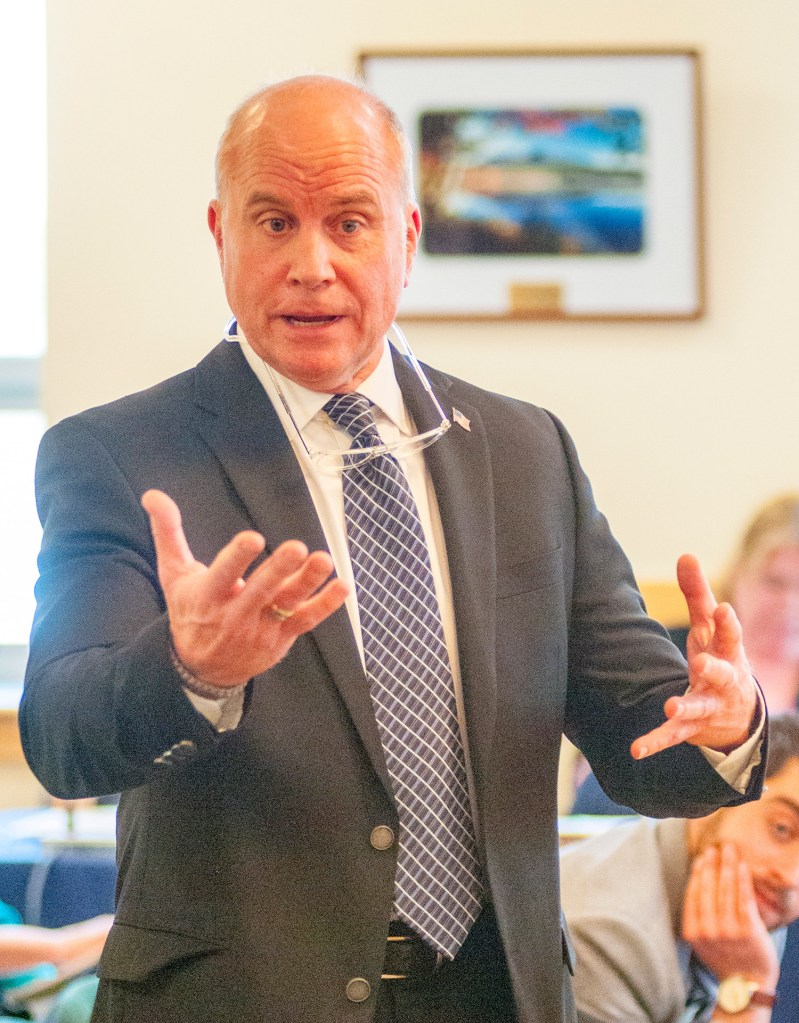AUGUSTA — Lawmakers heard hours of testimony Tuesday about the economic opportunities, enforcement challenges and regulatory headaches posed by recreational marijuana as the state slowly moves toward allowing retail sales of the drug.
While marijuana use became legal for Mainers age 21 and over on Jan. 30, lawmakers are just beginning the process of setting up a regulatory and enforcement framework before the licensing of commercial sales starts in February 2018. On Tuesday, more than 75 individuals – from medical marijuana growers to opponents of legal cannabis and municipal officials – testified during a wide-ranging public comment session to help inform that process.
“It needs to be a level playing field for all who are involved,” said Scott Durst, a 21-year veteran of the Maine Drug Enforcement Agency who now works as a security consultant to the cannabis industry. “Citizens of this state need to know they made the vote – it’s legal – but there has to be accountability and everybody needs to follow those rules.”
Others urged policymakers to “respect the will of the voters” and enable sales of marijuana despite uncertainty over the Trump administration’s attitude toward the eight states that have legalized a drug that is still prohibited under federal law.
“Question 1 has cleared more unexpected political roadblocks than most referendum questions in recent memory,” said Ryan Harmon, a former state lawmaker advocating on behalf of Legalize Maine, one of the two organizations behind the ballot initiative. “No more delays, no more changes, no more politics. Mainers have spoken. The time is now.”
RETHINKING FEDERAL ENFORCEMENT
However, events in Washington, D.C., were casting a long shadow over states that have legalized the drug.
Although the Obama administration had taken a hands-off approach as a growing number of states moved to legalize medical and recreational use of the drug, the Trump administration may be preparing to change that policy.
Last week, Trump spokesman Sean Spicer said he expects states to be subject to “greater enforcement” of federal laws against recreational marijuana use. And Tuesday, Attorney General Jeff Sessions – a vocal legalization opponent while an Alabama senator – further muddied that picture when he drew a link between marijuana and drug violence while saying the Trump administration would pursue “responsible policies” for enforcement.
“I’m definitely not a fan of expanded use of marijuana,” Sessions told reporters at the Justice Department, according to Politico. “States, they can pass the laws they choose. I would just say it does remain a violation of federal law to distribute marijuana throughout any place in the United States, whether a state legalizes it or not.”
Sen. Roger Katz, an Augusta Republican who co-chairs the Legislature’s Committee on Marijuana Legalization Implementation, said the committee is pushing forward with its work.
“But we have one eye on Washington,” Katz said in an interview. “We don’t have any control over Washington and we are assuming that we are going to move ahead with legalization like Colorado has done unless we hear differently.”
Maine voters voted by a narrow margin last November to allow adults age 21 and over to legally possess up to 2.5 ounces of marijuana and up to six adult plants, although use of marijuana is only legal in a private setting. The ballot initiative also sets up a process for retail sales of marijuana. However, the Legislature delayed the effective date of that part of the legalization measure until at least February 2018 in order to give state agencies time to draft rules and regulations regarding licensing, sales and enforcement.
The time needed to set up a retail marketplace leaves Maine in a gray area where it is legal to possess and use, but people can’t buy it without breaking the law.
The ballot initiative also allowed municipalities to restrict or prohibit retail marijuana shops or “social clubs” where patrons will eventually be allowed to consume marijuana in a private setting. Maine is the first state to open the door to such legal social clubs.
HOW MUCH TO TAX RETAIL POT SALES
One issue that lawmakers will have to settle before next February is how much to tax retail marijuana sales. The ballot initiative proposes a tax rate of 10 percent. The tax rates in the first four legalization states – Colorado, Washington, Oregon and Alaska – range from 25 percent to 37 percent.
Pete Tranchemontagne of Sanford, a medical marijuana caregiver who grows pot for his clients, proposed a 23 percent tax on recreational marijuana but no tax on medical marijuana. Tranchemontagne said recreational marijuana presents an economic opportunity for the state and that municipalities should benefit from the resulting tax revenues.
The new law allows towns to regulate the locations of marijuana businesses, and to ban them outright if they wish.
“We want towns to gain from this,” he said. “They get nothing out of a 10 percent tax, or little. We want incentives for towns not to go dry.”
Bangor city officials also pointed out that, under the current 10 percent tax structure, the state keeps all of the tax revenue while municipalities are required to bear many of the costs of enforcement. Patty Hamilton, director of public health for Maine’s third-largest city, said public health regulations are needed to minimize youth access to marijuana, address drugged driving and address “high-risk use” of marijuana with other drugs or alcohol.
“The time to put those regulations in place to protect public health and minimize negative consequences is now,” Hamilton said. “Options exist at this point that won’t exist in the future … and if we wait to put those restrictions in place and leave the industry to regulate itself, making money will dominate big decisions instead of protecting public health and safety.”
In both Washington and Colorado, drivers with 5 nanograms of active THC, the main psychoactive component in marijuana, per milliliter of blood can be charged with driving under the influence.
A study by AAA released last May found that fatal crashes involving drivers who used marijuana more than doubled – jumping from 8 percent to 17 percent – in Washington state between 2013 and 2014. The study also called blood-content limits for impaired driving from marijuana “arbitrary and unsupported by science.”
Several speakers at Tuesday’s hearing urged lawmakers not to tamper with the fast-growing medical marijuana industry in Maine, which legalized medicinal use of the drug in 1999. Their concerns are in response to comments from some individuals – including Gov. Paul LePage – questioning whether the state needs two different regulated systems now that pot is legal.
Medical marijuana laws provide access to patients who are not yet 21 and permit patients to possess larger amounts of pot than allowed for recreational use.
CLARIFYING IMPACT ON WORKPLACES
Representatives of business trade groups, meanwhile, urged lawmakers to flesh out the rules regarding workplace safety and the rights of companies to set drug policies for employees. Legalization has created confusion and uncertainty for employers that administer drug tests to workers because a positive test for marijuana use could reflect legal use weeks before and does not necessarily mean a person is under the influence.
The Committee on Marijuana Legalization Implementation is expected to review dozens of bills this session and into the summer before submitting recommendations to the full Legislature, likely early next year.
Kevin Miller can be contacted at 791-6312 or at:
Twitter: KevinMillerPPH
Send questions/comments to the editors.





